Table of Contents
- History of the Newfoundland Dog Breed
- Physical Characteristics of Newfoundland Dogs
- Personality Traits of Newfoundland Dogs
- Newfoundland Dogs and Water Rescue
- Famous Newfoundland Dogs in History
- Training Tips for Newfoundland Dogs
- Health Concerns for Newfoundland Dogs
- Newfoundland Dogs and Family Life
- Grooming and Care for Newfoundland Dogs
- Adopting a Newfoundland Dog: What You Need to Know
History of the Newfoundland Dog Breed
Newfoundland Dogs, also known as Newfies, have a rich history that dates back centuries. These dogs are believed to have originated from the island of Newfoundland, located off the coast of Canada. They were initially bred as working dogs and were used by fishermen for a variety of tasks, including hauling fishing nets, retrieving fish, and even rescuing people from the water.
Arrival of European Settlers
The Newfoundland Dog breed can trace its origins back to the arrival of European settlers in Newfoundland during the 16th century. These settlers brought with them their working dogs, which were then bred with the indigenous breeds that were already present on the island. This interbreeding led to the development of the Newfoundland Dog as we know it today.
Versatility and Adaptability
Newfoundland Dogs quickly became known for their versatility and adaptability. Their large size and strength made them ideal for working in the harsh conditions of Newfoundland, where they were required to perform a wide range of tasks. These dogs were not only used for fishing, but they were also employed as draft animals, pulling carts and sleds through the snow.
Popularity in Europe
The Newfoundland Dog breed became increasingly popular in Europe during the 19th century. This was due in part to their impressive size and strength, but also because of their reputation as loyal and gentle companions. In fact, it was not uncommon for Newfoundland Dogs to be kept as family pets, rather than working animals.
Recognition as a Breed
The Newfoundland Dog was officially recognized as a breed by the American Kennel Club (AKC) in 1886. Since then, the breed has continued to grow in popularity, both as a working dog and as a family pet. Today, Newfoundland Dogs can be found all over the world, and their gentle nature and impressive strength continue to make them a beloved breed among dog lovers.
Overall, the Newfoundland Dog breed has a fascinating history that spans centuries. From their origins as working dogs in Newfoundland to their status as beloved pets today, these dogs have played an important role in the lives of people all over the world.
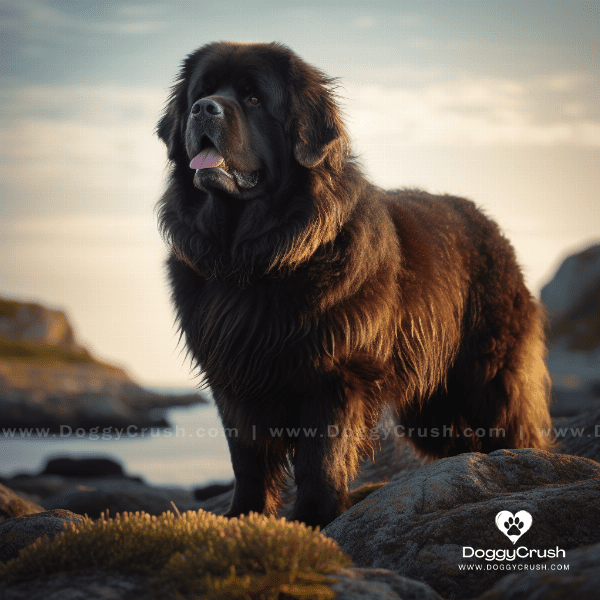
Physical Characteristics of Newfoundland Dogs
Newfoundland Dogs are a large and imposing breed, known for their size, strength, and thick, waterproof coat. They have a distinctive appearance that sets them apart from other breeds, and their physical characteristics make them well-suited to their original role as working dogs.
Size and Weight
One of the most notable physical characteristics of Newfoundland Dogs is their size. These dogs are considered to be one of the largest breeds, with males typically standing between 28-30 inches tall at the shoulder and weighing between 130-150 pounds. Females are slightly smaller, standing between 26-28 inches tall and weighing between 100-120 pounds.
Coat and Color
Newfoundland Dogs have a thick, double-layered coat that is designed to keep them warm and dry in cold, wet conditions. Their outer coat is long, coarse, and slightly wavy, while their undercoat is soft and dense. These dogs come in a variety of colors, including black, brown, gray, and black and white.
Build and Musculature
Newfoundland Dogs have a large, muscular build that is well-suited to their role as working dogs. They have a broad chest, powerful shoulders, and strong, sturdy legs. Their paws are webbed, which makes them excellent swimmers. This combination of strength and athleticism allows Newfoundland Dogs to perform a wide range of tasks, from hauling heavy loads to rescuing people from the water.
Facial Features
Newfoundland Dogs have distinctive facial features that are also well-suited to their role as working dogs. They have a broad, flat skull and a strong, square jaw. Their ears are small and set high on the head, and their eyes are deep-set and expressive. Overall, the physical characteristics of Newfoundland Dogs are a testament to their strength, athleticism, and adaptability, making them a beloved breed among dog lovers.
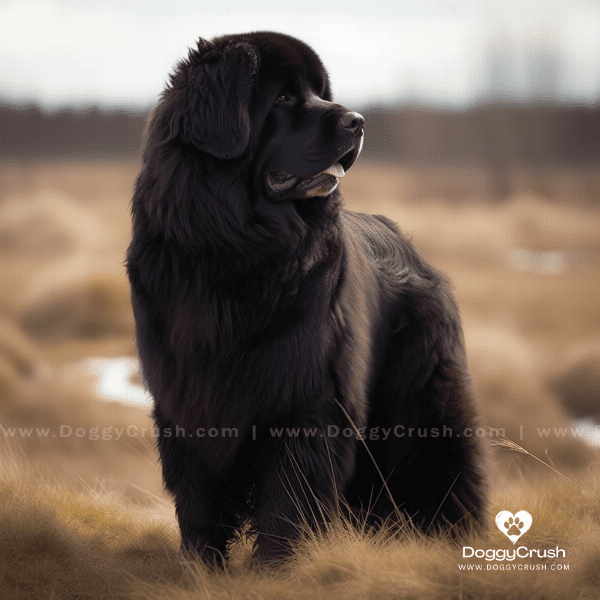
Personality Traits of Newfoundland Dogs
Newfoundland Dogs are known for their gentle, loyal, and affectionate personalities. They are often referred to as “gentle giants” due to their large size and calm temperament. These dogs have a reputation for being excellent family pets, and their friendly nature makes them popular with children and adults alike.
Affectionate and Loyal
One of the defining personality traits of Newfoundland Dogs is their affectionate and loyal nature. These dogs form strong bonds with their owners and are known for their unwavering devotion. They are often referred to as “velcro dogs” due to their tendency to stick close to their owners. This loyalty and affection make Newfoundland Dogs excellent family pets and companions.
Calm and Patient
Newfoundland Dogs are known for their calm and patient demeanor. They have a gentle and laid-back temperament that makes them well-suited to life as a family pet. These dogs are not known for being high-strung or excitable, and they are generally quite content to spend their days lounging with their owners.
Intelligent and Trainable
Newfoundland Dogs are intelligent and trainable, which makes them well-suited to a variety of roles. They are quick learners and are often used in search and rescue operations and as therapy dogs. These dogs respond well to positive reinforcement training techniques and are eager to please their owners.
Protective and Watchful
Despite their gentle nature, Newfoundland Dogs are also known for being protective and watchful. They are instinctively protective of their owners and will bark to alert them of any potential danger. These dogs are also excellent watchdogs and will keep a close eye on their surroundings.
Overall, the personality traits of Newfoundland Dogs make them a beloved breed among dog lovers. Their gentle nature, loyalty, and affectionate personalities make them excellent family pets, while their intelligence and trainability make them well-suited to a variety of roles.
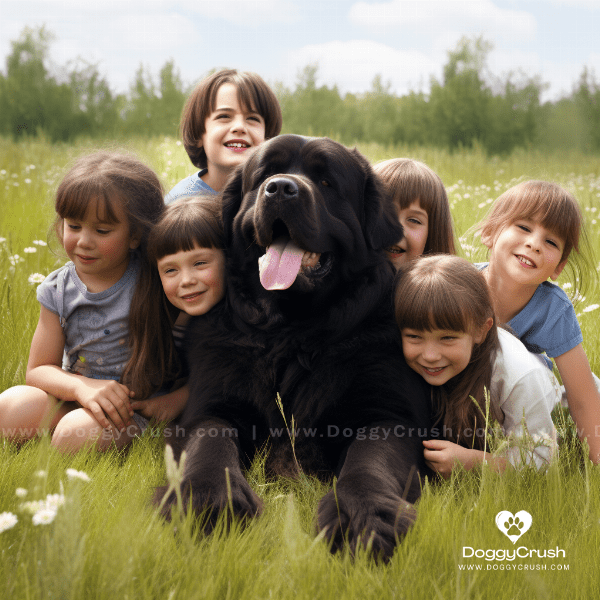
Newfoundland Dogs and Water Rescue
Newfoundland Dogs have a long history of working in water rescue. Their strength, swimming ability, and gentle nature make them well-suited to this type of work. These dogs have been used for water rescue operations for centuries, and their skills and abilities continue to be recognized and appreciated today.
Natural Swimming Ability
One of the key reasons that Newfoundland Dogs are so well-suited to water rescue is their natural swimming ability. These dogs are strong swimmers, with webbed paws and a thick, waterproof coat that allows them to stay warm and dry in cold water. Their large size and muscular build also make them well-suited to swimming in rough or choppy waters.
Rescue and Recovery Work
Newfoundland Dogs are often used for rescue and recovery work in the water. They are trained to swim out to people in distress and bring them back to shore or to rescue boats. These dogs are also used for recovery operations, where they help to locate and retrieve bodies from the water.
Life-Saving Skills
Newfoundland Dogs have a number of life-saving skills that make them valuable members of water rescue teams. They are trained to perform tasks such as towing boats, carrying ropes, and even pulling people to safety. Their calm and patient nature also makes them well-suited to comforting people in distress.
Recognition for Water Rescue Work
Newfoundland Dogs have been recognized for their contributions to water rescue work. In 1919, a Newfoundland Dog named Seaman accompanied the famous explorer Meriwether Lewis on his expedition across America. Seaman was credited with saving the lives of several members of the expedition, and he became a beloved companion and hero to Lewis.
Overall, the natural abilities and gentle nature of Newfoundland Dogs make them well-suited to water rescue work. These dogs have a long and proud history of performing life-saving tasks in the water, and their skills and abilities continue to be recognized and appreciated today.
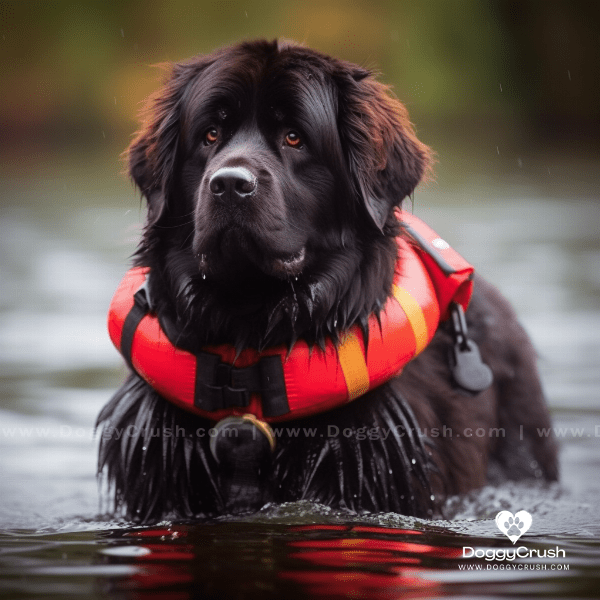
Famous Newfoundland Dogs in History
Newfoundland Dogs have played an important role in history, both as working dogs and as beloved companions. Over the years, many Newfoundland Dogs have become famous for their achievements and their impact on the world around them. Here are a few examples of some of the most famous Newfoundland Dogs in history.
Seaman
As mentioned earlier, Seaman was a Newfoundland Dog who accompanied the famous explorer Meriwether Lewis on his expedition across America. Seaman was known for his loyalty and bravery, and he played an important role in the success of the expedition. Seaman was also famous for his ability to catch fish, which he would bring back to the campsite for the explorers to eat.
Boatswain
Boatswain was a Newfoundland Dog owned by the famous poet Lord Byron. Boatswain was known for his impressive size and strength, and he weighed over 180 pounds. When Boatswain passed away, Lord Byron commissioned a monument to be built in his honor, which read, “Beauty without vanity, strength without insolence, courage without ferocity.”
Nana
Nana was a Newfoundland Dog who appeared in the novel “Peter Pan” by J.M. Barrie. Nana was the beloved nursemaid to the Darling children, and she was known for her gentle and nurturing nature. Nana was also famous for her ability to fly, which she demonstrated in the famous scene where she carries the children to Neverland.
Sable Chief
Sable Chief was a Newfoundland Dog who served as a rescue dog during the aftermath of the 9/11 terrorist attacks. Sable Chief worked tirelessly to search for survivors in the rubble, and his bravery and dedication earned him a place in history.
Hachiko
Hachiko was a Newfoundland Dog who lived in Japan in the 1920s. Hachiko was known for his loyalty to his owner, who was a professor at a university in Tokyo. Every day, Hachiko would accompany his owner to the train station, and then return in the evening to meet him when he returned from work. When his owner passed away, Hachiko continued to wait for him at the train station every day for the rest of his life.
These are just a few examples of the many famous Newfoundland Dogs who have made their mark on history. Their loyalty, bravery, and gentle nature continue to inspire people all over the world.
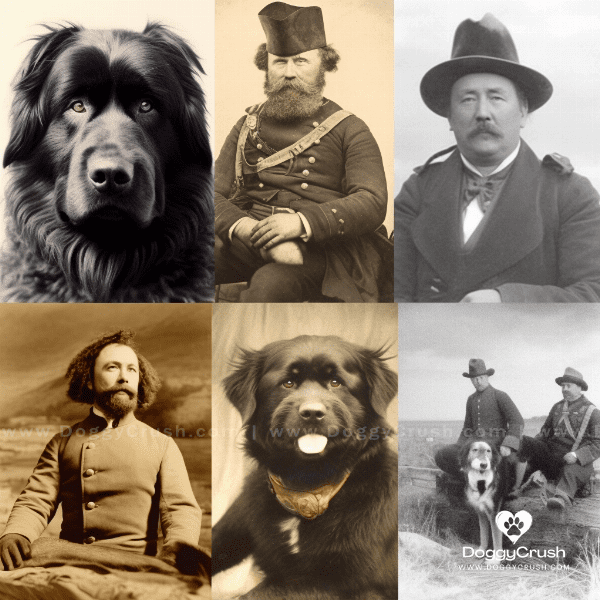
Training Tips for Newfoundland Dogs
Training a Newfoundland Dog can be a rewarding experience for both the owner and the dog. These dogs are intelligent and eager to please, and they respond well to positive reinforcement training techniques. Here are some tips for training your Newfoundland Dog.
Start Early
It’s important to start training your Newfoundland Dog early, ideally when they are still a puppy. This will help to establish good habits and prevent bad behaviors from developing. It’s also important to be consistent with training and to set clear boundaries and expectations from the beginning.
Use Positive Reinforcement
Newfoundland Dogs respond well to positive reinforcement training techniques, such as rewards and praise. This can include treats, verbal praise, and physical affection, such as petting or playing. It’s important to avoid punishment-based training techniques, as this can be counterproductive and may damage the bond between you and your dog.
Socialize Your Dog
Socialization is an important part of training for any dog, but it’s particularly important for Newfoundland Dogs. These dogs are naturally friendly and gentle, but they can become shy or anxious if they are not properly socialized. Socializing your dog involves exposing them to a variety of people, animals, and environments in a positive and controlled way.
Focus on Basic Commands
When training your Newfoundland Dog, it’s important to focus on basic commands such as sit, stay, come, and heel. These commands will help to establish good behavior and make it easier to control your dog in a variety of situations. It’s also important to be patient and consistent with training, as it may take some time for your dog to learn and master these commands.
Use Structured Training Sessions
Structured training sessions can be helpful for both you and your dog. These sessions should be short and focused, with clear goals and objectives. It’s also important to vary the training sessions and to make them fun and engaging for your dog.
Overall, training a Newfoundland Dog requires patience, consistency, and a positive attitude. By using positive reinforcement techniques, socializing your dog, focusing on basic commands, and using structured training sessions, you can help your dog to develop good behavior and become a well-trained and well-behaved companion.
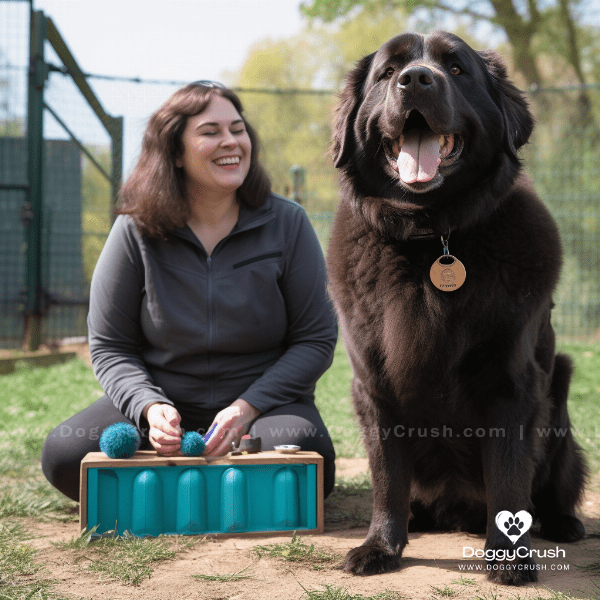
Health Concerns for Newfoundland Dogs
Newfoundland Dogs are generally a healthy breed, but like all dogs, they can be prone to certain health concerns. It’s important for owners to be aware of these concerns and to take steps to keep their dogs healthy and happy. Here are some of the most common health concerns for Newfoundland Dogs.
Hip Dysplasia
Hip dysplasia is a common health concern for many large Dog breeds, including Newfoundland Dogs. This condition is caused by an abnormal development of the hip joint, which can lead to arthritis and mobility issues. It’s important to have your Newfoundland Dog screened for hip dysplasia, and to take steps to prevent or manage the condition if it is diagnosed.
Heart Issues
Newfoundland Dogs can be prone to certain heart issues, including subaortic stenosis and dilated cardiomyopathy. These conditions can cause heart murmurs, arrhythmias, and other issues. It’s important to have your dog’s heart health monitored regularly by a veterinarian, and to take steps to manage any issues that are diagnosed.
Obesity
Newfoundland Dogs are prone to obesity, particularly as they age. This can be caused by a variety of factors, including overfeeding, lack of exercise, and genetic factors. Obesity can lead to a variety of health issues, including joint problems, heart disease, and respiratory issues. It’s important to keep your Newfoundland Dog at a healthy weight by providing a balanced diet and plenty of exercise.
Heat Sensitivity
Newfoundland Dogs have a thick coat that is well-suited to cold and wet conditions, but they can be sensitive to heat. It’s important to keep your dog cool and hydrated in warm weather, and to avoid leaving them in hot cars or other areas where they may become overheated.
Ear Infections
Newfoundland Dogs are prone to ear infections, particularly if their ears are not properly cleaned and maintained. It’s important to clean your dog’s ears regularly and to watch for signs of infection, such as itching, redness, and discharge.
Overall, by staying aware of these common health concerns and taking steps to prevent and manage them, you can help your Newfoundland Dog to live a healthy and happy life. Regular veterinary checkups and preventative care can also be helpful in keeping your dog healthy and catching any health issues early.
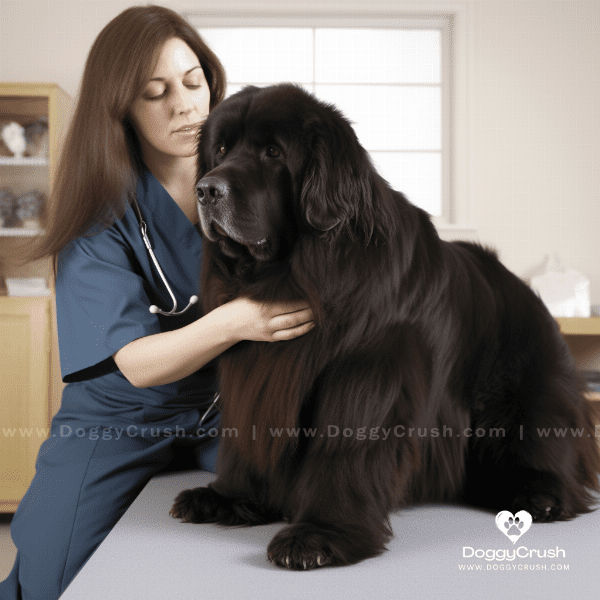
Newfoundland Dogs and Family Life
Newfoundland Dogs are a popular choice for families due to their gentle nature, loyalty, and affectionate personalities. These dogs are known for their love of children and their willingness to serve as loyal companions to their owners. Here are some things to consider if you’re thinking about adding a Newfoundland Dog to your family.
Gentle and Loving
One of the defining traits of Newfoundland Dogs is their gentle and loving nature. These dogs are known for their affectionate personalities and their love of children. They are patient and tolerant, making them a great choice for families with young children.
Active and Playful
Despite their large size, Newfoundland Dogs are often quite playful and active. They enjoy playing games, going for walks, and engaging in other activities with their owners. This can make them a great choice for families who enjoy spending time outdoors and being active.
Good with Other Pets
Newfoundland Dogs are generally good with other pets, including cats and other dogs. They have a gentle and tolerant nature that makes them well-suited to living with other animals. It’s important to socialize your Newfoundland Dog with other pets from a young age to help them develop good habits and behaviors.
Requires Grooming
Overall, Newfoundland Dogs can make great family pets for those who are willing to provide them with the love, attention, and care they need. With their gentle nature, playful personalities, and love of children, these dogs are well-suited to family life and can make wonderful companions for many years to come.
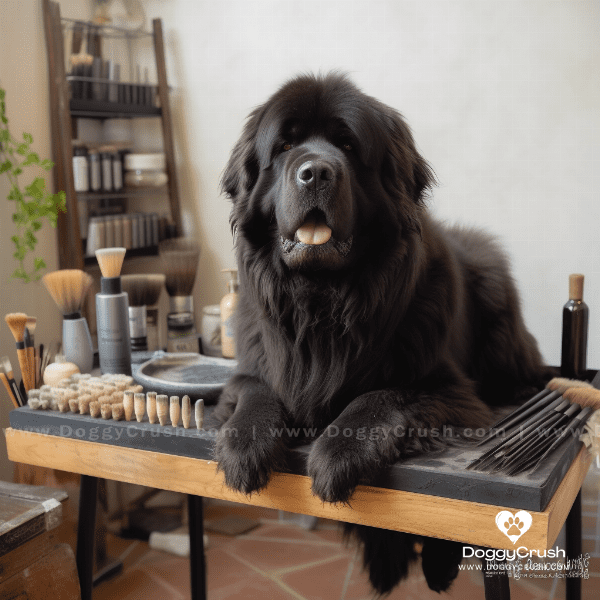
Grooming and Care for Newfoundland Dogs
Newfoundland Dogs have a thick, double coat that requires regular grooming to keep it healthy and free from mats and tangles. These dogs also have a number of other care needs that are important to consider if you’re thinking about adding one to your family. Here are some tips for grooming and caring for your Newfoundland Dog.
Regular Brushing
Regular brushing is essential for keeping your Newfoundland Dog’s coat healthy and free from mats and tangles. It’s recommended to brush your dog’s coat at least once a week, and more frequently during shedding season. A slicker brush or a comb with wide teeth can be helpful for getting through the thick fur.
Bathing
Newfoundland Dogs don’t require frequent bathing, but they may need a bath every few months or as needed if they get particularly dirty or smelly. It’s important to use a dog-specific shampoo and to rinse thoroughly to avoid leaving any soap residue behind.
Nail Trimming
Regular nail trimming is important for keeping your Newfoundland Dog’s nails at a healthy length. Long nails can cause discomfort and even lead to injury or infection. It’s important to use sharp nail clippers and to avoid cutting the quick, which is the pink part of the nail that contains blood vessels.
Dental Care
Dental care is an important part of overall care for any dog, including Newfoundland Dogs. Regular tooth brushing, dental chews, and other dental care products can help to keep your dog’s teeth and gums healthy and free from plaque and tartar buildup.
Exercise and Nutrition
Newfoundland Dogs require regular exercise and a balanced diet to maintain their health and wellbeing. It’s important to provide your dog with plenty of opportunities for exercise, such as walks, runs, or swimming sessions. A balanced diet that meets your dog’s nutritional needs is also important for keeping them healthy and happy.
Overall, by staying on top of your Newfoundland Dog’s grooming and care needs, you can help them to stay healthy, happy, and well-cared for. Regular grooming, nail trimming, dental care, and exercise and nutrition are all important components of a comprehensive care plan for these gentle and loving dogs.
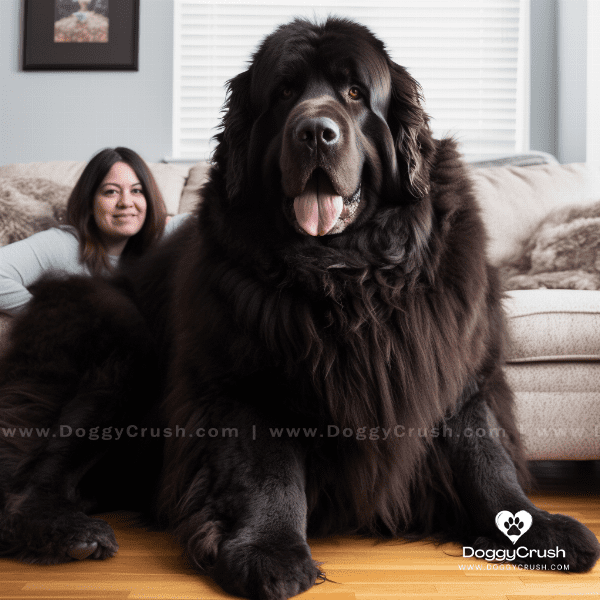
Adopting a Newfoundland Dog: What You Need to Know
Adopting a Newfoundland Dog can be a wonderful experience, but it’s important to be prepared for the unique needs and challenges that come with owning one of these gentle giants. Here are some things to consider if you’re thinking about adopting a Newfoundland Dog.
Size and Space
Newfoundland Dogs are a large breed and require plenty of space to move around and play. It’s important to have a home with enough space to accommodate their size, both indoors and outdoors. They may not be well-suited to living in apartments or small homes, and may do best in larger homes with plenty of outdoor space.
Grooming Needs
As mentioned earlier, Newfoundland Dogs have a thick, double coat that requires regular grooming to keep it healthy and free from mats and tangles. It’s important to be prepared for the grooming needs of a Newfoundland Dog and to establish a regular grooming routine.
Exercise and Activity
Newfoundland Dogs are an active breed and require plenty of exercise and activity to stay healthy and happy. This can include daily walks, swimming sessions, and other forms of physical activity. It’s important to provide your dog with plenty of opportunities for exercise and activity to prevent boredom and behavior problems.
Training and Socialization
Newfoundland Dogs are intelligent and eager to please, but they can be strong-willed and independent at times. It’s important to establish clear boundaries and expectations from the beginning and to use positive reinforcement training techniques to encourage good behavior. Socialization is also important for helping your Newfoundland Dog to develop good habits and behaviors around people and other animals.
Health Concerns
As with any breed, Newfoundland Dogs can be prone to certain health concerns. It’s important to be aware of these concerns and to take steps to prevent or manage them if they arise. Regular veterinary checkups and preventative care can also be helpful in keeping your dog healthy and catching any health issues early.
Overall, by being prepared for the unique needs and challenges that come with owning a Newfoundland Dog, you can provide your dog with a loving and supportive home. With their gentle nature, affectionate personalities, and love of family, these dogs can make wonderful companions for many years to come.




